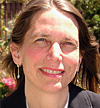Chief of UCSF's HIV/AIDS Division at San Francisco General Hospital's
Positive Health Program, Diane Havlir devotes her life to improving the treatment and care of people living with HIV in San Francisco and around the world.
Her passion and optimism are expressed in her tone and her ideas, like her plan this year to photographically chronicle the story of the epidemic on the hallways of the famous HIV/AIDS clinic at the General. Havlir describes this as just one very visual way to "remember and respect the victims of AIDS since the beginning of the epidemic, and to inspire us toward the ultimate goal - finding a cure."
For years, Havlir has been at the cutting edge of the advances that transformed HIV from a fatal infection to a chronic, manageable disease. She initially pioneered simple prophylactic regimens for complications of AIDS. She subsequently led some of the first clinical studies of antiretroviral agents that illustrated the limitations of monotherapy and HIV drug resistance.
The real breakthrough came in 1995 when several groups around the country, including Havlir's, began administering the first multi-drug "cocktails" of antiretroviral medications. For the first time, lasting suppression of HIV was achieved, and patients experienced sustained improvements in their health. Havlir has continued investigations to define optimal and tolerable HIV treatment regimens.
Over the last two decades, researchers and clinicians have made significant progress toward managing HIV/AIDS and Havlir has been a key contributor. She recently returned to UCSF to lead the Positive Health Program at SFGH. This program is recognized worldwide for its excellence and innovation in HIV education, research and clinical care. More than 3,500 people receive regular care on the world-renown Ward 86 in building 80 on the SFGH campus. Here direct patient care is provided by what Havlir describes as a "phenomenal and dedicated staff" that includes some of the most published and consulted HIV experts in the world.
In addition to providing ongoing HIV clinical care to patients, the Positive Health Program offers a variety of integrated services tailored to the needs of its particular patients. Examples include a weekly support group for HIV and Hepatitis C co-infected patients, a special women's support group, and Positive Health Access to Services and Treatment, a new effort to facilitate the rapid referral of hospitalized, positive patients directly into specialized care at Ward 86.
On the research front, the program's faculty includes leading principal investigators of national and international clinical trials addressing the most pressing questions in HIV science including: drug resistance, acute infection, structured treatment interruptions, long-term non-progression, new drug classes and immune enhancement.
In HIV education, the division provides a wealth of programs for both the public and health care communities. For the past 17 years, the Positive Health Program has produced the Medical Management of AIDS, an annual three-day conference. The event, held every December in San Francisco, attracts hundreds of local, regional and international providers.
The Positive Health Program also sponsors a popular weekly Grand Rounds lecture series at the SFGH Carr Auditorium. Talks draw a broad audience ranging from faculty to social workers; recent topics included drug interactions between HIV therapies and other medications, HIV-related renal disease and organ transplantation for HIV positives. Selected lectures are also recorded for webcasting via the respected online portal
HIVInsite. And, to enable and encourage future world-class practitioners to come to SFGH for their training, the Positive Health Program administers two unique, specialized fellowships: the HIV Clinical Scholarship and the HIV Translational Research Fellowship.
In addition to this broad scope of HIV work in San Francisco, the program's mission also includes considerable international efforts toward combating the pandemic.
Says Havlir: "One of the reasons I came back to UCSF was because of the institution's strong commitment to global health."
And as director of the division, Havlir leads many projects dedicated to advancing HIV treatment worldwide. She is an architect and author of the World Health Organization's HIV treatment guidelines for resource limited settings and a founding member of the WHO HIV Global Drug Resistance Monitoring Program. Havlir and colleagues at SFGH are also actively investigating the interactions between tuberculosis, malaria and HIV in Sub-Saharan Africa and defining optimal treatment strategies through collaborative research programs.
Havlir cites the partnership between UCSF and the SFGH/Department of Public Health as a critical element of her program. "This collaboration supports and benefits our commitment to state-of-the-art patient care, high-caliber research, public service, and teaching," Havlir says. "We are dedicated to the San Francisco community and are committed to making significant advances toward combating HIV internationally. There is no better place to accomplish this work than here."
Photo by Majed
Links:
Positive Health Program
HIVInsite

